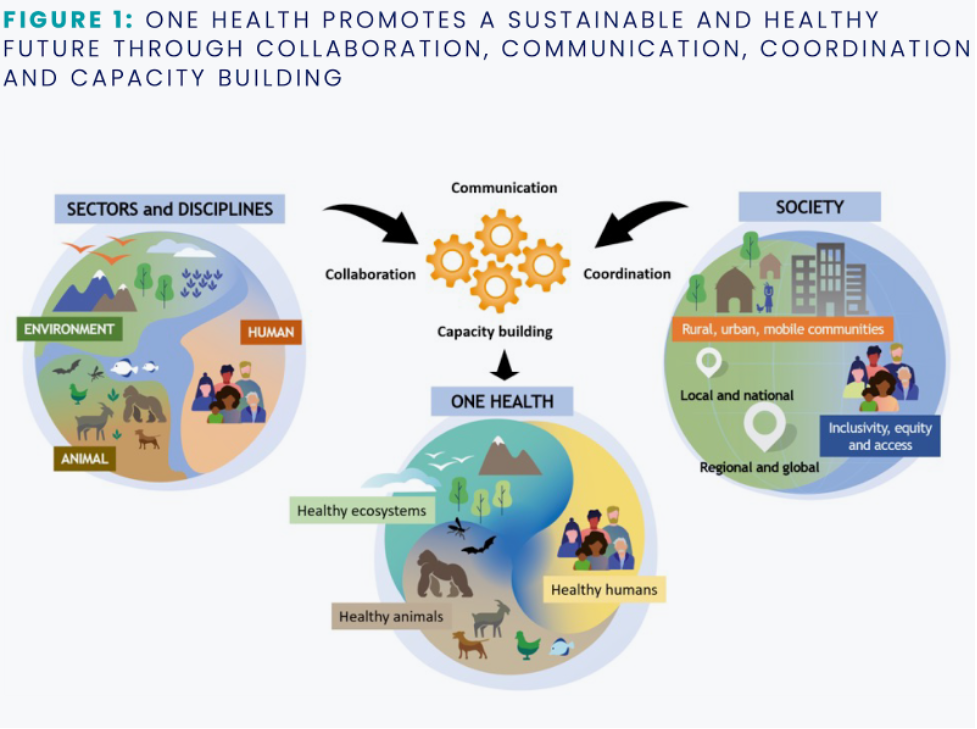One Health: A holistic approach to communicating about global health issues
Human-driven activities are prompting unprecedented environmental change, and underlining anew the close connections between human, animal, and environmental health. A relatively new concept, One Health, is gaining acceptance as a fair and powerful strategy for protecting all three. I encourage scientists to consider how they can use One Health to reach diverse audiences and expand the impact of their work.
“One Health” is a holistic approach that aims to tackle global health issues by acknowledging these interconnected relationships and finding lasting, sustainable solutions. One Health describes a team effort by communities, policy makers, and experts to encourage collaboration and plan effective responses. It also represents a major shift from previous research approaches that primarily considered separate disciplines and individual responses.

Figure 1. “One Health” promotes a sustainable and healthy future through collaboration, communication, coordination and capacity building (modified from The One Health Joint Plan of Action (2022–2026) (OH JPA).)
Human activities contribute to more extreme weather, habitat destruction, and environmental pollution. We are clearly leaving a big ecological footprint and an epidemiological one - diseases are more commonly jumping between humans and animals and vice versa. One Health helps us to see and understand the connections between ecological and epidemiological impacts. After all, areas and people hit hardest by disease (re)emergence are usually also dealing with the harshest impacts of human-driven environmental changes.
Unfortunately, these regions usually bear the least responsibility for the changes that are harming them. Rather, decisions made by others - usually the self-appointed first-world nations - are behind their suffering.
Raising awareness about One Health can engage all sectors of society in addressing global health challenges linked to environmental changes. The concept is vast, and may at times feel overwhelming, but One Health’s power lies in emphasizing our shared responsibility towards the planet and empowers individuals to take meaningful actions. Of course, while individuals collectively can - and do - make a difference, It’s important to note that positive actions can be hampered by adverse government policies. At the root, our responsibility is societal - when we make changes at a societal level, we can begin to see real impact.
In engaging discussions about One Health, I suggest scientists:
- Prioritize approachability and clarity by avoiding excessive technicalities.
- Simplify complex concepts by using relatable, real-world examples.
- Foster a sense of individual agency by emphasizing the impact of small, everyday actions and the importance of collaboration.
- Emphasize the shared societal responsibility that makes One Health a unique approach.
One Health represents fairness and equity in tackling the interconnected issues of global health and biodiversity preservation in the face of human-driven environmental changes. However, there is still a funding bias towards projects implemented in first-world countries. Scientists and citizens should urge for increased funding in projects where it matters the most, as by understanding how human, animal, and environmental health are all connected, and taking a big-picture approach is vital for an equitable and sustainable future. This can be achieved only by championing global cooperation, as health and environmental challenges do not stop at country borders.
If you would like to know more about One Health and how to communicate these concepts you can visit the World Health Organisation (WHO) “One Health Initiative” website and the Enetwild project (one of the largest and most long-running “One Health” projects worldwide) website.
